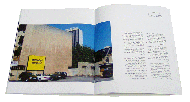![]()
Angelika Neuwirth
We are fortunate to have among us today a number of distinguished scholars from various Lebanese universities: Pater Sélim Abou, Professor at the Saint Joseph University; Ridwan al-Sayyid, Professor at the Lebanese University and founder and editor for many years of the magazine Ijtihad; Doumit Salameh, Professor at the Notre Dame University; Henry Cremona, Professor at the University of Saint-Esprit de Kaslik; Fitnat Messaiké of the Islamic Cultural Centre in Beirut and Richard Dean, Professor at the American University of Beirut. We were hoping that Judge Muhammad Hasan Al-Amin would also be present today, but sadly he had to apologize for reasons of ill-health. With us is the artist Roland Kreuzer who established his project weltfragen in several European states since 2001 and the art historian Andrea Schwarzkopf. Together with the association Kunst ist gut she is supporting the work of Roland Kreuzer. We also welcome Kirsten Maas, Director of the Beirut office of the Heinrich Böll Foundation. Our moderator today will be Georges Zeynati, Emeritus Professor of Philosophy at the Lebanese University, a specialist in Kant's thinking.
Today's meeting is part of a larger event organised by Kunst ist gut in cooperation with the Heinrich Böll Foundation, Beirut. You will have noticed the large yellow billboard posters shown all over Beirut, on the university campuses, in commercial centres and on public buildings, particularly in Hamra. They are part of an installation created by Roland Kreuzer. Though occupying commercial space and using commercial media these posters reflect the very topics of our symposium, presenting the Four Kantian Questions: What is the human being? What can I know? What should I do? What may I hope for?
The newspaper An Nahar recently published an extensive essay on the poster installation written by Michel Qabalan. Let me quote some of his observations. He wrote: "Roland Kreuzer has created posters presenting the Kantian Questions in various sizes and in more than 40 European and international languages. Passers-by are confronted with yellow posters inscribed with black writing, which at first sight they may hardly understand. Even the alphabet or letters used may in some cases be unfamiliar to them. But once the observer has come across a poster in his or her own language, he or she will become curious and wonder what these billboards are doing in the city. Why are there posters in languages that foreign to the place? Why posters with philosophical questions instead of commercial advertisements? It is the repeated confrontation with Kant's questions that will eventually arouse the reader's personal interest in the questions."
It is at this point - where we begin to ask the Kantian questions ourselves - that our symposium sets in. Why Kant in Lebanon? - The lectures that we will be presented in the course of this morning, will hopefully inspire us with meaningful answers. Let me only add a few words of my own about what we do not intend with our venture. This symposium should not be regarded as an attempt to import ideas of enlightenment from the West to the East. Times have passed when it was customary to ascribe the achievement of enlightenment exclusively to the West and to question the possibility of enlightenment to take place in other cultures. After the cultural analyses presented by Edward Said and other scholars is has become impossible to claim that Islam and Near Eastern culture never experienced enlightenment nor would be able to experience it in future. Such an approach - emerging from narrow essential thinking - would provide a convenient argument in support of the theory of the Clash of Civilizations.
As against that, I am proud to mention that in the very field of Oriental Studies, a systematic deconstruction of the ste-reotype of the "absent enlightenment" in the Near East is currently being pursued. Enlightenment is not bound to a particular historical period - to the contrary: in our era of globalization, enlightenment should be understood as no more than a general frame to encompass a diversity of enlightening traditions such as are encountered in the East as much as in the West. We should not forget that the discourse of reason itself had been wide-spread in the East long before it came to migrate to the West. - The contemporary French philosopher Jean-François Lyotard claims that the name of Kant marks both the beginning and the end of modernity, it can be regarded as the concluding end of modernity and thus to herald the new epoch of post-modernity. This does not imply that Kant's philosophy will be implemented and turn into reality in post modernity, but that it in the nature of his philosophy to provoke a re-determination of the traditional notion of historical progress.
We look forward to the lectures with much curiosity.
Angelika Neuwirth
Reason and Responsibility in Society
© Neuwirth 2006
edited by Andrea Schwarzkopf & Roland Kreuzer
Berlin 2006
With contributions of Sélim Abou, Henry Cremona, Richard C. Dean, Roland Kreuzer, Fitnat Messaiké, Angelika Neuwirth, Doumit Salameh, Ridwan al-Sayyid, Andrea Schwarzkopf, Georges Zeynati.
English, German and Arabic, 80 pages, 50 photographs., 21 x 25 cm, costs including delivery: 10 €

